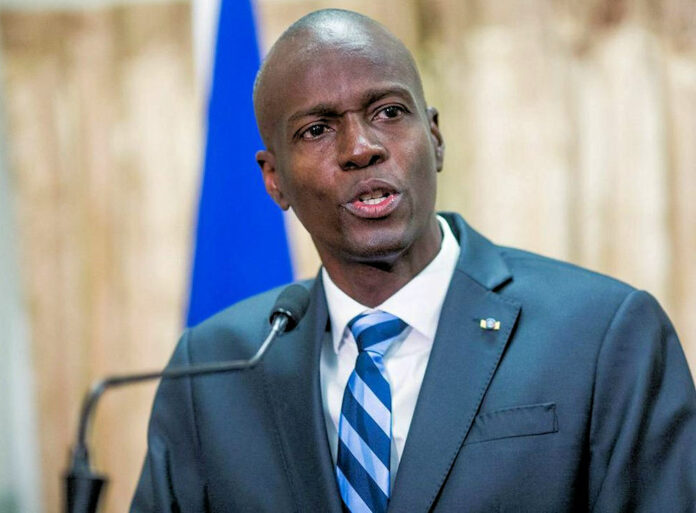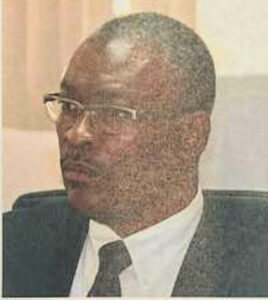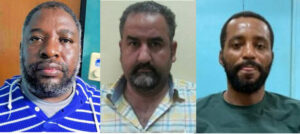
July 7, 2022. It’s been one year since Haiti’s President Jovenel Moïse was machine-gunned at home in front of his wife and children.
The murder was carried out by a commando of Colombian assassins presumably in the service of Haiti’s political and economic oligarchs, whose identities are still unknown. For a year, this case has been in the hands of examining magistrates. For a year, five investigating judges appointed by the Dean of Port-au-Prince’s High Court, Bernard Saint-Vil, have received and then passed on the case, not one of them making any headway. In short, the investigation has gone almost nowhere in a year, and the most horrific magnicide of modern times remains unsolved.
Nonetheless, several people have been arrested in Haiti, Jamaica, the Dominican Republic, Turkey, and Panama. Most of them are now imprisoned in Haiti, but the most important ones are held in the United States.
Others are still on the run, like Joseph Félix Badio, the alleged mastermind of the plot, believed to be somewhere in Haiti. Haitian-Jordanian businessman Samir Handal was arrested in Ankara, Turkey in November 2021. Haiti requested his extradition, but the Istanbul Criminal Court released him on Mon., Jul. 4, 2022, saying that the documents provided by Haiti’s justice officers did not make clear how Handal was concretely implicated in the crime. As a result, Turkey rejected Haiti’s extradition request and freed Handal.

Some actors are also dead. In addition to three Colombian mercenaries whom Haitian policemen killed in the gun battles after the assassination, there is the case of businessman and former coup-plotting police chief Marie-Jude Gilbert Dragon, who died in Port-au-Prince’s National Penitentiary, reportedly of Covid-19.
The three most important prisoners accused of central roles in the murder are being held in Florida by U.S. authorities. They are former Haitian Senator John Joël Joseph (arrested in Jamaica), former convicted Haitian drug trafficker Rodolphe “Whiskey” Jaar (arrested in the Dominican Republic), and former Colombian soldier and mercenary Mario Antonio Palacios Palacios (arrested in Panama).
These suspects are being held in the U.S., at least in part, because some of them have worked with and for the U.S. government. Indeed, in April, a Federal judge in Miami allowed the U.S. government to withhold from Palacios’ defense attorney unspecified evidence on the grounds that it was a “potential threat… to [U.S.] national security.” Meanwhile it’s a matter of record that Jaar was previously a Drug Enforcement Agency (DEA) informant.
The Haitian state, being totally dependent on and, indeed, installed by Washington, will find it nearly impossible to bring back to Haiti any of these suspects to answer for their actions.
At the same time, at least three businessmen who are also U.S. citizens – Antonio Intriago, Walter Veintemilla, and Arcangel Pretel Ortiz – hired and helped finance, from U.S. soil, the Colombian mercenaries who killed Moïse. But not one of the trio has been charged or arrested.
By supposedly wanting to protect its informants, the Biden administration is only making more credible charges that, at the very least, Washington was aware of the coup. The links between the most prominent alleged criminals and U.S. intelligence services deepens this suspicion. It is evident already that many of those involved in the plot were either “dormant” or perhaps still active U.S. agents.
Meanwhile, former Senator John Joël Joseph snuck into Jamaica after the assassination with his wife and two children, lived clandestinely in a remote village named Elizabeth, but was squealed on and picked up by the local police. In May, he was extradited to the U.S..
Currently, there are 40 individuals of various nationalities suspected of participation in Moïse’s assassination who are under lock and key in Port-au-Prince without any of them being tried or sentenced.

Joseph Félix Badio, whom the Colombians say ordered them over the phone to shoot Jovenel Moïse, is, it seems, a close friend of and occasional visitor to the current Prime Minister a.i Ariel Henry. Officially, Badio is the crime’s “Most Wanted” suspect, actively sought by the Haitian National Police and Interpol. Nevertheless, he has remained untraceable for the past 12 months, despite several reports that he has visited Henry’s residence. This suggests there is good reason why Haitian political and judicial authorities are dragging their feet in the investigation.
The four previous investigating judges were, in order, Mathieu Chanlatte, Garry Orélien, Chavannes Etienne, and Merlan Belabre, each of whom, for one reason or another, were either removed from the case for corruption or quit citing security concerns.
After discussions with judges from different jurisdictions who have experience and, above all, courage, Dean Saint-Vil convinced the examining magistrate Walther Wesser Voltaire of Port-au-Prince’s High Court to take over the case. This latest investigating judge is experienced enough to carry out the investigation, said Saint-Vil on Radio Vision 2000 on Tue., May 31, 2022:
“Magistrate Walther Wesser Voltaire previously worked in the Human Rights Sector. In 2010, he was appointed Deputy Government Commissioner at the Port-de-Paix High Court. Then, for six years, he held the position of judge at Port-de-Paix High Court and the same position at the Croix-des-Bouquets High Court during this same period of time. Also, Walther Wesser Voltaire was sworn in as an investigating judge at the Croix des Bouquets High Court before being transferred as judge and investigating judge to the Port-au-Prince High Court by the Superior Council of Power Judicial [CSPJ]. We want this designation to be the very last so that Judge Voltaire can issue a final order for there to be a trial on this heinous act against President Jovenel Moïse.”
Walther Wesser Voltaire was formally appointed the case’s investigating judge on May 30, 2022.
According to Saint-Vil, there were many meetings with “the executive” (one presumes PM Ariel Henry), Justice Minister Berto Dorcé, Chief Prosecutor Jacques Lafontant, and members of the CSPJ to provide assistance, resources, and protection to the new judge. All, it seems, promised to provide the necessary means and security for Voltaire to carry out his investigation.
Now, more than a month after Voltaire’s appointment, there is still complete radio silence about the investigation. We only know that a few hearings have been held and a number of summons issued in the greatest secrecy. Voltaire is undoubtedly drawing from last August’s excellent and detailed 122-page report by the DCPJ (Central Directorate of the Judicial Police). Complicating matters is the fact that, since the beginning of June 2022, the courthouse where the Port-au-Prince prosecution is based has been occupied by the “Five Seconds” gang from Village-de-Dieu.
A gang occupies the halls of justice. The prime minister apparently communicates with the man, his friend, who ordered the murder. The U.S. is holding three of the key suspects, and withholding evidence. The ruling groups who are surely the intellectual authors and chief financiers of the assassination until today remain unknown and control most of Haiti’s politicians. What a challenge for justice to be found for this grisly crime!











[…] le quatrième anniversaire de L’assassinat du président Jenel Moïse Les approches du 7 juillet, dégoûtantes avec le CPT, qui est dominée par ses adversaires, se […]